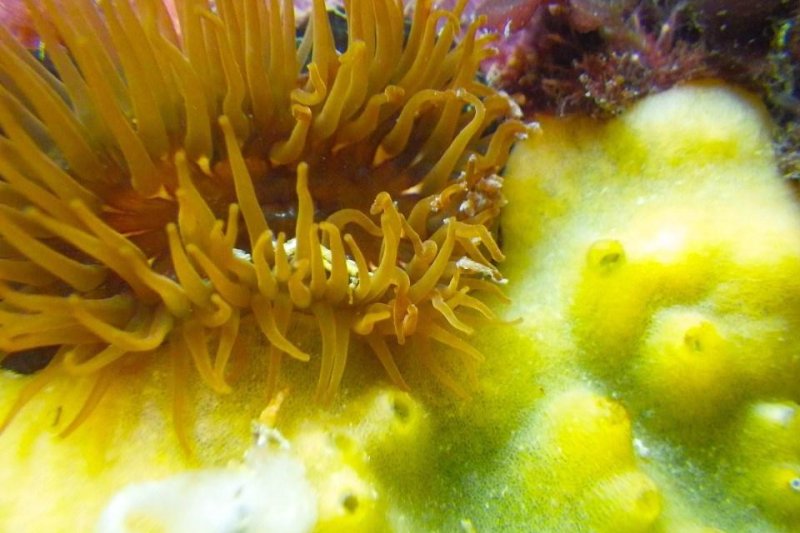Marine sponges like the bread crumb sponge, seen here growing next to a sea anemone, produce dozens of novel chemical compounds. Photo by the National Park Service
Nov. 21 (UPI) -- Scientists have for the first time developed rapid cell lines for marine sponges, a largely untapped source of novel chemicals, many of which boast medicinal qualities.
Cell lines are cells from multicellular organisms that are programmed to divide indefinitely. Cell lines from vertebrates, insects, and plants are vital to research in a variety of scientific fields, but researchers have, until now, failed to produced invertebrate cell lines.
Scientists have previously identified dozens of medically relevant compounds produced by marine sponges, but harvesting drug candidates from wild sponges isn't ecologically sustainable.
Luckily, researchers at Florida Atlantic University reached a breakthrough in biotechnology, successfully boosting the rate and number of cell divisions. Scientists bolstered the marine vertebrate cell cultures by growing cells in a unique amino acid-optimized nutrient medium.
In lab tests, cells from nine marine sponge species grew and divided at accelerated rates in the novel medium. The fastest-growing cells doubled in less than an hour, and subcultures from three of the species produced an average of nearly six population doublings, with lifespans of 21 and 35 days. Cells cultured in artificial seawater either remained the same or decreased.
Researchers described their invertebrate cell culture breakthrough Thursday in the journal Scientific Reports.
In addition to being used to search for and produce drug candidates and other medically relevant compounds, marine sponge cell lines can be used by evolutionary biologists to study early animal evolution.
"Cell lines of common reef sponges also could be used to quantify the effects of climate change such as ocean warming and acidification on uptake of dissolved organic material, a major component of the 'sponge loop hypothesis' of carbon cycling, and to test the hypothesis that coral reefs could become sponge reefs as climate changes," Shirley Pomponi, senior study author and a research professor at FAU's Harbor Branch, said in a news release.
Because marine sponges can't move as adults, they've been forced to evolve complex chemical systems for communication and defenses from predators. But scientists have only investigated the many unique chemical compounds by a small percentage of the more than 9,000 marine sponge species.
Researchers hope their latest breakthrough will help scientists survey the secondary metabolites produced by previously unstudied sponge species.















